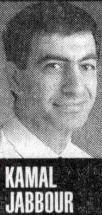

Olympic Marathon Trials
Process Needs Reform
Published May 15, 2000 in The Post-Standard.By Dr Kamal Jabbour, Contributing Writer
The victory of Rod De Haven at the US Olympic Trials in the marathon on Sunday May 7 in Pittsburgh was a sad moment in the history of American distance running. Since De Haven has not achieved the Olympic A standard of 2 hours 14 minutes, he will be the only American competing in the men's marathon in Sydney.
Earlier this year, USATF adopted a new procedure for selecting the Olympic teams. In the marathon, the procedure provided for two scenarios. In the first scenario, if the winner of the Olympic trials has achieved the A-standard, the winner and the next two finishers who have achieved the A-standard make the team.
In the second scenario, if the winner of the Olympic trials has not achieved the A-standard, he will be the lone US representative in Sydney. This limit of one runner derives from the International Olympic Committee's rule to classify nations by the quality of their runners. Those nations with more than one fast runner can field a team of up to three marathoners who have met the A-standard. Those nations unable or unwilling to form a team of three A-standard qualifiers may send at most one runner who has met a slower B-standard.
In the case of the US, only three men have run faster than 2:14 in the past year. They are newly-sworn citizen Khalid Khannouchi, who set a world record of 2:05:42 in Chicago last October; David Morris, who finished fourth in Chicago in an American record of 2:09:32; and Joe LeMay, who won the California International Marathon in 2:13:55.
The Olympic team selection process would have been elementary in most countries. If only three runners have met the qualifying standard, they form the team. Not around here. Traditionally, our Olympic teams in track and field are selected in a sudden death process of winner takes all. In a perfect simulation of Olympic competition, yearlong and lifelong performances take a backseat at the trials.
This year's marathon selection process has evidently backfired. Last February, Christine Clark shocked the running world by winning the women's Olympic marathon trials, but missed the qualifying A-standard. She became an American team of one for the women's Olympic marathon, a feat which De Haven repeated in Pittsburgh with the men's marathon.
Thus, for the first time in the history of the Olympics, the greatest nation on earth will send only one man and one woman to run the marathon. Countless third world countries, not to mention first and second world countries, will field complete teams of three. What went wrong?
Before I answer my rhetorical question or assign blame, I wish to congratulate De Haven and Clark on their victories. They are our national champions who rose to the occasion, defeating the best and the rest in a most grueling competition. On separate Sunday mornings in Columbia and Pittsburgh, they survived the hills, heat and humidity, and surpassed their fellow runners.
Unlike the shorter track events, running a marathon is a very demanding physical activity. We cannot expect marathon runners to stand and deliver at will. Nor can we expect them to race three marathons in one year. First, they must race to qualify for the trials. Then they must race the trials to qualify for the Olympics. Finally, they must represent the US in the Olympics, competing on tired legs against the world's best.
Just as many trial participants went to Columbia and Pittsburgh for the honor and the experience with little or no hope of qualifying for the Olympics, so will our Olympians in Sydney. With their performances slower than a hundred other runners from around the world, the Americans will run for the honor of representing us with little hope of winning.
The time has come for the US to reform the Olympic selection process and abolish the marathon trials. The marathon is a trial in itself. The concept of marathon trials is a literary redundancy whose time has passed. De Haven and Clark will certainly be ambassadors of good will to the Olympics, but it will take a lot more than good will to bring marathon Olympic medals back home. Nevertheless, we wish them Godspeed.
Kamal Jabbour looks forward to watching the Olympic trials on television next June. His tape-delayed RUNNING Column appears in The Post-Standard on Mondays. He is Chief Engineer of TrackMeets.com, the world leader in live track webcasting, and receives email at jabbour@syr.edu.
